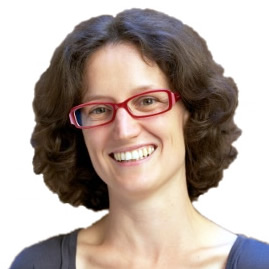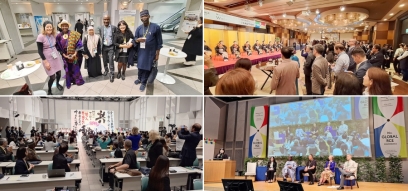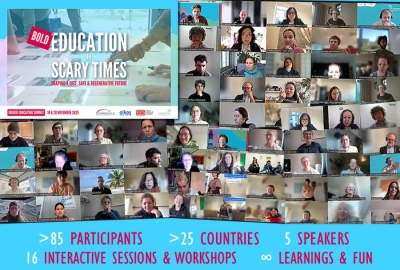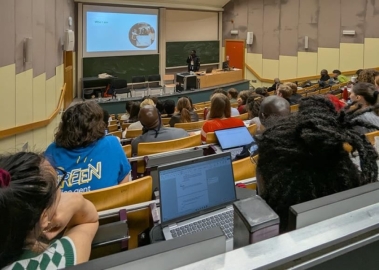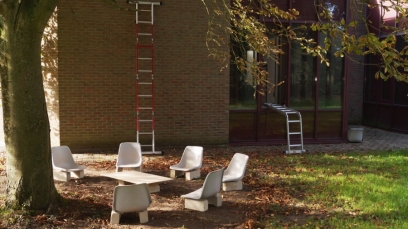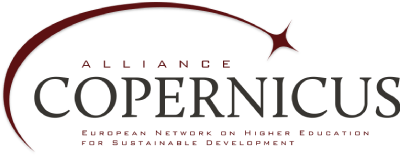#9 07/2021
Lisa Bohunovsky
Strategic ESD specialist at BOKU Vienna
| _ |
"All BOKU students should deal intensively with sustainability at least once during their studies." |
Anne Zimmermann (AZ) Lisa, we met for the first time in 2016, at the COPERNICUS Alliance conference organized by the University of Natural Resources and Life Sciences (BOKU) in Vienna, entitled “Sustainability Transformation of Science Systems”. We were both involved in our respective universities’ strategies to mainstream sustainable development in teaching. Can you briefly describe the strategy followed by BOKU at the time?
Lisa Bohunovksy (LB) In 2013, BOKU started a broad participatory process to develop a first sustainability strategy. More than 100 objectives and measures were developed according to five main topics: research, teaching, operations, identity and society. Thus, teaching was only one aspect of our strategy process. Nevertheless, the objective that “all BOKU students should deal intensively with sustainability at least once during their studies” was ranked highest by the participants of the final workshop. This probably has to do with the fact that sustainability traditionally plays a crucial role at BOKU and that most study programmes are somehow (to a larger or smaller extent, explicitly or implicitly) related to the topic. On the one hand, this seems to be a great starting point to promote education for sustainable development (ESD), on the other hand, it hinders further progress – because for some members of BOKU faculty, there is no specific need to undertake further efforts in this regard.
Thus, our strategy was to start a bottom-up movement and to motivate and support those faculty members who are interested in ESD. We – i.e. members of the Centre of Global Change and Sustainability who coordinate the strategy process – initiated a working group on ESD that is still active today and started several initiatives: for example, it offered delivery of an ESD input to study programme managers in the very first phase of BOKU bachelor programmes, and it developed a discussion paper on core ESD aspects that all BOKU students should learn about during their studies.
Building on the latter, the working group started a peer-learning series for lecturers. BOKU faculty members present their approaches to ESD, and by discussing these in a larger group, we learn from each other and further develop our attempts to strengthen ESD. These peer learnings have proven quite successful.
By the way: As part of our sustainability reporting according to GRI standards, a so-called materiality assessment was conducted. In the course of the assessment, the topics “ESD” and “inter- and transdisciplinary teaching” were again identified as “material topics”, which are considered to be significant topics with high impact in the context of sustainability.
AZ I find it very interesting that respondents throughout the university initially agreed on the need to expose all students to sustainability at least once during their studies: such a high degree of agreement is not the norm. But you seem to be critical of the fact that this led a large number to believe that they would not need to change anything in their teaching – in other words that their study programme was already offering such an anchor point. I imagine that the working group on ESD would like to show their colleagues that content knowledge alone is insufficient, and that a focus on competences for sustainable development needs to be fostered through student-centred learning formats? How does the working group hope to convince their colleagues in this bottom-up process?
LB Indeed, it is interesting that ESD always gets high levels of agreement. I assume that the university members who participate in the processes and surveys on sustainability share the conviction that teaching can prepare the next generation to deal with sustainability issues and to make a change. Yet, there might be (or probably is) a sampling bias, so I am not sure if the degree of agreement is actually that high throughout the university – especially when it comes to a common understanding of what “exposing all students to sustainability” means.
Back to your question: Instead of convincing our colleagues that content knowledge is insufficient, we try to build on what is already existent at the university. By creating opportunities and showing good examples in our peer learning meetings, we promote awareness and motivation.
AZ This sounds familiar: building on what colleagues already do and know is what we have also found the most efficient strategy in mainstreaming ESD. What role does the Sustainicum Collection play in this process?
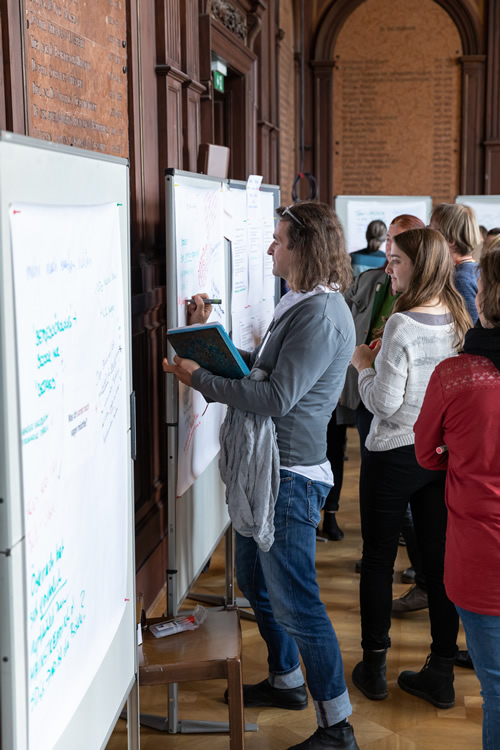 LB The Sustainicum Collection is an online platform for teaching resources and participative teaching methods for sustainability that was originally developed with partners from the Technical University of Graz and the University of Graz. University teachers, but also school teachers, can use these resources for free and are at the same time invited to contribute their methods and materials to the platform. Especially at the beginning of the process, workshops to develop and test these resources played an important role in fostering networking between researchers. A project extension allowed for widening networking and knowledge exchange with south-eastern European countries.
LB The Sustainicum Collection is an online platform for teaching resources and participative teaching methods for sustainability that was originally developed with partners from the Technical University of Graz and the University of Graz. University teachers, but also school teachers, can use these resources for free and are at the same time invited to contribute their methods and materials to the platform. Especially at the beginning of the process, workshops to develop and test these resources played an important role in fostering networking between researchers. A project extension allowed for widening networking and knowledge exchange with south-eastern European countries.
Half a year ago, we started a two-step training series (introduction and in-depth workshop) at BOKU to reach new staff members and to increase the use of the platform. Moreover, as part of the Epicur project, the course “Sustainicum Collection”will be offered by my BOKU colleague, Julia Wlasak, and Stefanie Klose (University College Freiburg) to students for the first time. The course for students will start in the winter semester of 2021 in cooperation with the University of Freiburg and enhances the importance of students’ perspectives in teaching and learning: As possible change agents and target group of the Sustainicum Collection, students contribute their valuable perspectives as learners – and thereby become teachers themselves: Under the approach “Learning to teach sustainability”, students first get to know the Sustainicum Collection and its teaching resources with the principles of ESD and try them out. In an interactive and creative process, students then further develop the teaching resources in small groups, taking into account their various perspectives, or develop completely new teaching resources that they try out with their fellow students as learners. These (further) developed teaching resources also fill the Sustainicum Collection and are made permanently available to teachers.
AZ What a wonderful idea to include students in the group of addressees! First, this is a very coherent application of a key ESD principle: we are all both learners and teachers. I am convinced that you will get very interesting contributions from students because it will be empowering for them – though certainly also very challenging – to be given such a role. By the way, I can really recommend the Sustainicum Collection: I first encountered it when I wrote an abstract for the 2016 CA conference in Vienna; all contributors were invited to consult the collection as a source of inspiration for making their workshop more interactive and creative. This was a revelation to me.
Let us come back to your university’s ESD strategy: Is BOKU using any kind of incentive for teachers who wish to integrate sustainability competences in their teaching?
LB Apart from the aforementioned training series on the Sustainicum Collection, the ESD working group now also offers a two-step basic course in Education for Sustainability. Since 2020, BOKU also awards an annual BOKU Sustainability Prize for ESD worth € 1,000 for the winner and € 400 each for two further nominees. University staff and students can apply for this prize for their ESD activities, which can be lectures, but also extra-curricular activities or projects in collaboration with schools. At the same time, the decision to include ESD in teaching activities or not depends very much on the personal motivation of the staff. As ESD Working Group we would be very happy if team teaching for interdisciplinary courses were better accounted for by BOKU – but so far financial restrictions have made this impossible.
AZ This is a nice array of offers. Again, including students as potential ESD actors is a brilliant idea in my view, and reveals that the canvas of your strategy is likely a whole-university approach. In order to complete the picture of BOKU’s sustainability strategy, may I return to the beginning of this conversation? You mentioned that your consultation process included five themes. Could you briefly explain the last two of the five themes – identity and society? Indeed, the normal foci of sustainable development at HEIs are usually operational ones – the first three you mention.
LB The two topics of “identity” and “society” derive from the AISHE-method, on which we built in the first round of our sustainability strategy (2014–2018). By now, we call these two topics “organizational culture” and “exchange with society”. “Organizational culture” includes questions of social sustainability, communication, health, cooperation, but also the question of how the sustainability process, its vision and mission are implemented at BOKU. “Exchange with society” touches on public relations as well as the question how the university and its members relate with societal actors and issues of transdisciplinarity. We use these five categories to report on sustainability issues in our sustainability report, which was first published according to GRI standards in 2020 – with the plan to publish a GRI-certified report every year from now.
AZ Many thanks for this conversation. I’m convinced COPERNICUS Alliance members will find inspiration for moving the sustainable development agenda forward in a holistic way.
Contact Lisa Bohunovsky:
Download full conversation as pdf

